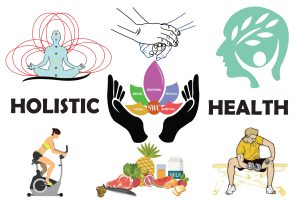Transforming Your Life through Holistic Health Practices

The Importance of Holistic Health
Holistic health emphasizes the interconnectedness of the mind, body, and spirit. A person’s overall well-being is influenced by more than just physical health; it includes emotional and spiritual dimensions as well. This approach recognizes that when one aspect of health is neglected, others can suffer too. For example, stress from work can lead to physical issues like headaches or fatigue.
- Transforming Your Life through Holistic Health Practices
- The Importance of Holistic Health
- Understanding Your Body's Connection
- Mind-Body Connection
- Practicing Mindfulness
- Achieving Emotional Balance
- Nutrition and Diet
- Incorporating Whole Foods
- Understanding Nutritional Needs
- Physical Activity
- Finding the Right Exercise Routine
- Benefits of Regular Movement
- Rest and Relaxation
- Importance of Quality Sleep
- Stress Management Techniques
- Healing Therapies
- Exploring Traditional Medicine
- Alternative Healing Practices
- Spiritual Wellness
- Connecting with Your Inner Self
- Meditation and Its Benefits
- Creating a Holistic Lifestyle
- Setting Health Goals
- Establishing Healthy Habits
- Building a Support System
- Surrounding Yourself with Positivity
- Seeking Professional Guidance
- Maintaining Balance
- Prioritizing Self-Care
- Finding Work-Life Balance
- Benefits of Holistic Health:
- Improved emotional resilience
- Enhanced physical vitality
- Greater spiritual fulfillment
A holistic lifestyle provides a more comprehensive view that often translates into improved quality of life and longevity.
Understanding Your Body’s Connection
Understanding how each part of your being interacts fosters a deeper relationship with yourself. Imagine feeling stressed (emotional aspect), which may lead to muscle tension (physical aspect). By recognizing this connection, you can take proactive steps to address both areas simultaneously—maybe through deep breathing exercises or yoga.
- Key Connections to Consider:
- Stress management for physical health
- Nutrition’s role in emotional stability
- Exercise’s impact on mental clarity
Cultivating a greater awareness of these connections can open the door to a more balanced and fulfilling life journey.
Mind-Body Connection
Practicing Mindfulness
As we continue our exploration of holistic health, the mind-body connection plays a crucial role in our overall well-being. Practicing mindfulness is one effective way to strengthen this connection. Mindfulness encourages us to live in the present moment, reducing stress and enhancing our sense of calm. Imagine starting your day with a few minutes of mindful breathing—simply focusing on your breath, noticing the sensations in your body. Over time, this practice can transform how you respond to stressors.
- Simple Ways to Practice Mindfulness:
- Morning meditation (5-10 minutes)
- Mindful walking during breaks
- Journaling to reflect on thoughts and feelings
These small changes can lead to significant improvements in mental clarity and emotional stability.
Achieving Emotional Balance
With mindfulness as a foundation, achieving emotional balance becomes more accessible. Emotional balance is about recognizing and managing emotions effectively rather than letting them control you. Consider the analogy of a pendulum. When life swings in one direction—stress or anxiety—it’s vital to find ways to bring it back to the center.
- Tools for Emotional Balance:
- Reframing negative thoughts
- Engaging in hobbies that bring joy
- Seeking support from friends or professionals
By embracing these practices, individuals can foster resilience, leading to a calmer, more centered state of being.
Nutrition and Diet
Incorporating Whole Foods
As we delve deeper into holistic health, nutrition and diet are pivotal to nurturing the mind-body connection. Incorporating whole foods into your meals can significantly enhance your overall health. Whole foods are unprocessed or minimally processed items that are closer to their natural state—think fruits, vegetables, grains, and healthy fats. For instance, swapping out refined snacks for fresh fruits or nuts can provide more nutrients while satisfying cravings.
- Benefits of Whole Foods:
- Rich in vitamins and minerals
- High in fiber for digestive health
- Lower in added sugars and unhealthy fats
Making these simple substitutions can lead to improved energy levels and a stronger immune system.
Understanding Nutritional Needs
Alongside incorporating whole foods, understanding your nutritional needs is vital for effective wellness. Each person’s dietary requirements can vary based on factors like age, activity level, and health goals. Consider how your body feels after certain meals; this self-awareness can guide you towards what best fuels you.
- Key Nutritional Considerations:
- Balance macronutrients (carbs, proteins, fats)
- Stay hydrated with water
- Pay attention to portion sizes
By listening to your body and tailoring your diet to your needs, you create a nourishing foundation that supports both mental and physical wellness.
Physical Activity
Finding the Right Exercise Routine
Transitioning from nutrition to physical activity, exercise is a foundational pillar of holistic health. Finding the right exercise routine that suits your lifestyle and personal interests can make all the difference in maintaining consistent physical activity. It’s essential to experiment with different forms of exercise to discover what resonates with you. For example, someone may thrive on high-energy workouts like spinning, while another might prefer the calm of yoga.
- Tips for Choosing the Right Routine:
- Try a variety of classes (dance, pilates, martial arts)
- Consider outdoor activities like hiking or cycling
- Listen to your body’s signals—if it feels good, you’re on the right track!
By discovering an enjoyable routine, individuals are more likely to stick with it long-term, promoting better health outcomes.
Benefits of Regular Movement
Engaging in regular movement has myriad benefits that extend beyond physical fitness. Consistent exercise boosts mental clarity and emotional stability, making it a cornerstone of holistic well-being.
- Key Benefits of Regular Movement:
- Releases endorphins—natural mood boosters
- Aids in maintaining a healthy weight
- Enhances sleep quality and energy levels
A good example of this is when a friend shares how a routine walking session with her partner has transformed their relationship and improved their mood. Embracing movement is not just about physical fitness; it’s a holistic approach that nurtures body and mind, leading to a happier, healthier life.
Rest and Relaxation
Importance of Quality Sleep
As we transition from physical activity to rest and relaxation, it’s crucial to highlight the importance of quality sleep in maintaining holistic health. Sleep is the body’s natural way of healing and rejuvenating. Without enough rest, both physical and mental health can deteriorate. For instance, when an individual skips sleep for a few nights, they may notice increased irritability and difficulty concentrating—the body’s way of signaling that it needs time to recharge.
- Key Benefits of Quality Sleep:
- Improves memory and cognitive function
- Enhances emotional well-being
- Supports a strong immune system
Prioritizing quality sleep can dramatically affect your daily life, helping to create a more balanced lifestyle.
Stress Management Techniques
Alongside ensuring adequate sleep, managing stress is vital for overall well-being. Incorporating stress management techniques into your routine can significantly enhance relaxation and improve your quality of life. Consider practices such as deep breathing exercises or engaging in creative hobbies.
- Effective Stress Management Techniques:
- Mindfulness meditation or yoga
- Nature walks for fresh air and reflection
- Journaling to process emotions and experiences
A personal story comes to mind: a friend of mine discovered that taking 10 minutes each day to meditate not only helped her cope with a demanding job but also brought a newfound sense of tranquility to her home life. By prioritizing rest and employing stress management techniques, individuals can cultivate resilience, which ultimately leads to a more harmonious existence.
Healing Therapies
Exploring Traditional Medicine
Continuing our journey into holistic health, healing therapies play a pivotal role in promoting overall well-being. Exploring traditional medicine can offer valuable insights and treatments that have stood the test of time. For many cultures, traditional practices like acupuncture, herbal remedies, and Ayurveda provide holistic approaches to health. Consider how a friend of mine experienced significant relief from chronic headaches through acupuncture sessions, which complemented her conventional medical treatments.
- Key Aspects of Traditional Medicine:
- Emphasis on prevention and balance
- Use of natural herbs and remedies
- Incorporation of rituals and community practices
These approaches remind us that healing often requires addressing body, mind, and spirit as interconnected components.
Alternative Healing Practices
In addition to traditional methods, alternative healing practices have gained popularity for their unique approaches to wellness. Techniques such as Reiki, aromatherapy, and sound healing focus on energy balance and emotional restoration. For example, engaging with essential oils can elevate mood and reduce anxiety; many individuals report feeling more centered after a simple aromatherapy session.
- Popular Alternative Healing Techniques:
- Reiki for energy healing and stress reduction
- Sound baths to promote deep relaxation
- Homeopathy for individualized treatment
Embracing these alternative practices can enhance your health and foster a more profound connection with the healing process. Ultimately, exploring both traditional and alternative pathways allows individuals to tailor their wellness journey, leading to a more enriched life experience.
Spiritual Wellness
Connecting with Your Inner Self
As we delve into spiritual wellness, connecting with your inner self becomes essential for achieving a balanced life. Spiritual wellness involves understanding your purpose, values, and beliefs, which can bring clarity and peace to your everyday experiences. Consider how someone might take time for self-reflection, perhaps through journaling or quiet contemplation. This personal time allows individuals to explore their feelings and intuition, leading to a deeper understanding of themselves.
- Ways to Connect with Your Inner Self:
- Engaging in creative pursuits like art or music
- Spending time in nature for reflection
- Practicing gratitude and appreciation daily
These practices nurture a sense of inner harmony and fulfillment that extends beyond external experiences.
Meditation and Its Benefits
An essential component of fostering spiritual wellness is meditation, which offers numerous benefits for the mind, body, and spirit. By embracing meditation, individuals can cultivate mindfulness and create a routine that fosters a deeper spiritual connection. A friend who struggled with anxiety found solace in meditative practices, allowing her to navigate life’s challenges with greater ease.
- Benefits of Meditation:
- Reduces stress and promotes relaxation
- Enhances focus and mental clarity
- Encourages emotional healing and resilience
Incorporating meditation into daily life opens doors to greater self-awareness and emotional stability, enhancing one’s spiritual journey. Embracing these practices can lead to a profound sense of peace and understanding, deeply enriching the holistic health experience.
Creating a Holistic Lifestyle
Setting Health Goals
As we transition from exploring spiritual wellness, creating a holistic lifestyle truly brings everything together. Setting health goals is the first step towards achieving a balanced and fulfilling life. These goals can serve as guiding stars, helping you stay focused on your journey toward holistic health. For instance, rather than setting vague goals like “eat healthier,” try creating specific, measurable targets, such as “incorporate two servings of vegetables into every meal.”
- Effective Goal-Setting Tips:
- Make goals specific and actionable
- Break larger goals into smaller, manageable steps
- Regularly review and adjust goals as needed
By approaching health goals with intention and clarity, individuals can foster motivation and accountability.
Establishing Healthy Habits
Once goals are established, the next crucial step is creating healthy habits that support those objectives. Habits form the foundation of daily routines and can either enhance or detract from your overall wellness. Consider how my colleague started her day with a morning walk—this simple habit not only invigorated her but also set a positive tone for the rest of her day.
- Tips for Establishing Healthy Habits:
- Identify key habits that align with your goals
- Start small; focus on consistency rather than perfection
- Reward yourself for milestones achieved
By gradually integrating healthy habits into daily life, individuals can transform their health aspirations into reality, paving the way for a vibrant holistic lifestyle. This continuous cycle of setting goals and establishing habits creates a sustainable path toward well-being.
Building a Support System
Surrounding Yourself with Positivity
As we move from establishing healthy habits, building a support system is crucial for maintaining a holistic lifestyle. Surrounding yourself with positivity can significantly impact your mental and emotional well-being. The people you choose to spend time with should uplift and inspire you, creating an environment where you can thrive. Take my friend, for example—she made a conscious effort to connect with those who encouraged her fitness journey. As a result, her motivation skyrocketed, and she felt more accountable to her goals.
- Ways to Cultivate Positivity:
- Engage with friends who share similar health aspirations
- Participate in community groups or activities that uplift you
- Limit exposure to negative influences, whether people or environments
Creating this supportive circle helps foster an atmosphere of encouragement, resilience, and happiness.
Seeking Professional Guidance
In addition to surrounding yourself with positive influences, seeking professional guidance can further enhance your holistic health journey. Professionals such as nutritionists, personal trainers, or therapists can provide tailored advice and support based on your specific needs. For instance, after struggling with her diet, one of my colleagues consulted a nutritionist who helped her craft a meal plan that accommodated her lifestyle and health goals.
- Benefits of Professional Support:
- Tailored strategies and actionable insights
- Accountability and motivation from an expert
- Access to diverse resources and knowledge
By leveraging professional guidance, individuals can enhance their understanding of health and well-being, making their holistic journey more effective and enjoyable. Building a robust support system, both personally and professionally, is key to sustaining motivation and promoting lasting change.
Maintaining Balance
Prioritizing Self-Care
As we conclude our exploration of building a support system, maintaining balance becomes paramount in sustaining a holistic lifestyle. Prioritizing self-care is essential for nurturing both your physical and mental well-being. It’s all about recognizing your needs and making time for activities that rejuvenate you. For example, setting aside a few minutes each day for a calming ritual—like reading, taking a bath, or practicing yoga—can have profound effects on your overall mood and energy levels.
- Self-Care Ideas to Consider:
- Schedule regular “me time” in your calendar
- Explore hobbies that excite and inspire you
- Practice mindfulness or meditation to recharge
By putting self-care at the forefront, individuals can enhance their ability to manage stress and better enjoy life’s experiences.
Finding Work-Life Balance
Equally important is finding work-life balance, which directly contributes to overall well-being. In today’s fast-paced world, blurring lines between work and personal time can lead to burnout. Being intentional about separating the two can rejuvenate your spirit. Consider my former co-worker who dedicated Fridays to remote work, allowing her weekends to be purely for family and personal interests.
- Strategies for Achieving Work-Life Balance:
- Set clear boundaries: designate work hours and stick to them
- Use technology wisely, minimizing distractions after hours
- Plan fun activities with loved ones to recharge
By actively pursuing work-life balance, individuals can create a more fulfilling and harmonious environment, allowing space for both professional growth and personal joy. Ultimately, maintaining this balance is vital for a thriving holistic lifestyle.





